
Francis Albert Sinatra was an American singer and actor. Nicknamed the "Chairman of the Board" and later called "Ol' Blue Eyes", Sinatra was one of the most popular entertainers of the 1940s, 1950s, and 1960s. He is among the world's best-selling music artists with an estimated 150 million record sales.

Dean Paul Martin was an American singer, actor, and comedian. One of the most popular American entertainers of the mid-20th century, he was nicknamed "The King of Cool." Martin gained his career breakthrough together with comedian Jerry Lewis, billed as Martin and Lewis, in 1946. They performed in nightclubs and later had numerous appearances on radio and television and in films.
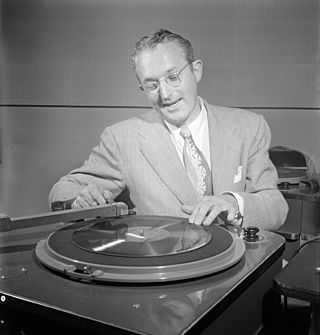
Thomas Francis Dorsey Jr. was an American jazz trombonist, composer, conductor and bandleader of the big band era. He was known as the "Sentimental Gentleman of Swing" because of his smooth-toned trombone playing. His theme song was "I'm Getting Sentimental Over You". His technical skill on the trombone gave him renown among other musicians. He was the younger brother of bandleader Jimmy Dorsey. After Dorsey broke with his brother in the mid-1930s, he led an extremely successful band from the late 1930s into the 1950s. He is best remembered for standards such as "Opus One", "Song of India", "Marie", "On Treasure Island", and his biggest hit single, "I'll Never Smile Again".

"Stardust" is a jazz song composed by American singer, songwriter and musician Hoagy Carmichael with lyrics by Mitchell Parish. Now considered a standard and part of the Great American Songbook, the song has been recorded over 1,500 times either as an instrumental or vocal track, featuring different performers. During his time attending Indiana University, Carmichael developed a taste for jazz. He formed his own band and played at local events in Indiana and Ohio. Following his graduation, Carmichael moved to Florida to work for a law firm. He left the law sector and returned to Indiana, after learning of the success of one of his compositions. In 1927, after leaving a local university hangout, Carmichael started to whistle a tune that he later developed further. When composing the song, he was inspired by the end of one of his love affairs, and on the suggestion of a university classmate, he decided on its title. The same year, Carmichael recorded an instrumental version of the song for Gennett Records.

Louis Capone was a New York organized crime figure who became a supervisor for Murder, Inc. Louis Capone was not related to Al Capone, the boss of the Chicago Outfit. Capone was convicted of murder in 1941, and sentenced to death. He was electrocuted at Sing Sing Prison on March 4, 1944.
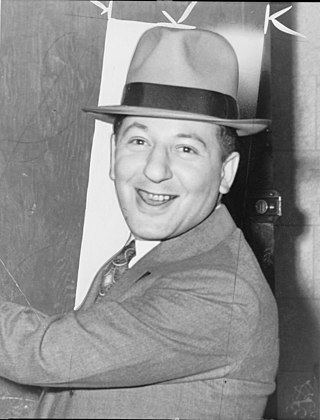
Louis Buchalter, known as Louis Lepke or Lepke Buchalter, was an American mobster and head of the Mafia hit squad Murder, Inc., during the 1930s. Buchalter was one of the premier labor racketeers in New York City during that era.
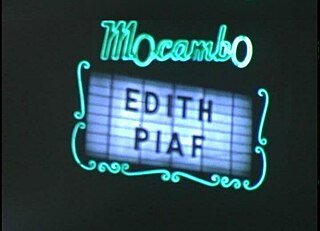
The Mocambo was a nightclub in West Hollywood, California, at 8588 Sunset Boulevard on the Sunset Strip. It was owned by Charlie Morrison and Felix Young.

Richard Benjamin Haymes was an Argentinian singer, songwriter and actor. He was one of the most popular male vocalists of the 1940s and early 1950s. He was the older brother of Bob Haymes, an actor, television host, and songwriter.
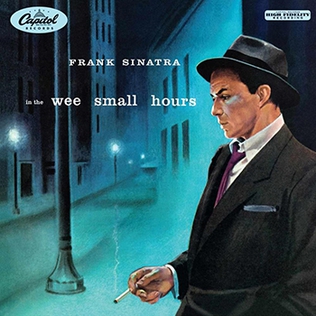
In the Wee Small Hours is the ninth studio album by American vocalist Frank Sinatra. It was released in April 1955 by Capitol and produced by Voyle Gilmore with arrangements by Nelson Riddle. All the songs on the album deal with themes such as loneliness, introspection, melancholy, desolation, lost love, failed relationships, depression, and night life. The cover artwork reflects these themes, portraying Sinatra alone on an eerie and deserted city street at night awash in blue-tinged street lights. In the Wee Small Hours has been called one of the first concept albums.
"You'll Never Know", sometimes referred to as "You'll Never Know " in later years, is a popular song with music written by Harry Warren and the lyrics by Mack Gordon. The song is based on a poem written by a young Oklahoma war bride named Dorothy Fern Norris.
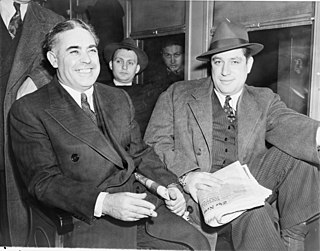
Emanuel "Mendy" Weiss was an American organized crime figure. He was an associate of the notorious Louis Buchalter and part of Buchalter's criminal organization known as Murder, Inc. during the 1930s and up to the time of his arrest for murder in 1941, for which he was convicted and, in 1944, executed. The Federal Bureau of Narcotics claimed that Weiss and his partner in crime Philip "Little Farvel" Cohen were heavily involved in narcotics trafficking. Although he was indicted on multiple drug charges, Weiss was never sentenced for any of these crimes.
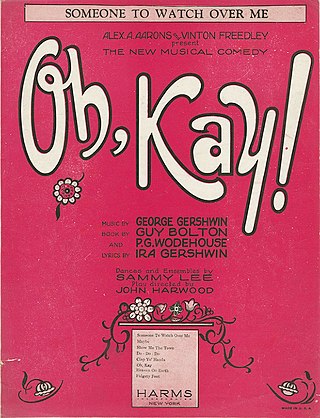
"Someone to Watch Over Me" is a 1926 song composed by George Gershwin with lyrics by Ira Gershwin, assisted by Howard Dietz who penned the title. It was written for the musical Oh, Kay! (1926), with the part originally sung on Broadway by English actress Gertrude Lawrence while holding a rag doll in a sentimental solo scene. The musical ran for more than 200 performances in New York and then saw equivalent acclaim in London in 1927, all with the song as its centerpiece. Lawrence released the song as a medium-tempo single which rose to #2 on the charts in 1927.

The Hoboken Four was an American musical quartet formed in 1935, uniting a trio of Italian-American musicians who called themselves the 3 Flashes with aspiring singer Frank Sinatra. The trio had been based in Hoboken, New Jersey, before meeting Sinatra in 1934, after which Sinatra drove them and their instruments to gigs outside the city and occasionally performed with them. Following their winning performance on the Major Bowes Amateur Hour on September 8, 1935, the newly-formed quartet embarked on a seven-month tour of the central and western United States and Canada with one of Major Bowes' touring companies. Tensions between the quartet members escalated, however, to the point that Sinatra was regularly beaten by the other members, and he quit the tour halfway through. He returned to Hoboken to pursue a solo career, while the rest of the group disbanded after the tour ended.
"Sunday, Monday or Always" is a 1943 popular song with music by Jimmy Van Heusen and lyrics by Johnny Burke.

Roy Landman, better known as Snooky Lanson, was an American singer known for co-starring on the NBC television series Your Hit Parade.

"Take My Love" is a 1950 pop song co-written and recorded by Frank Sinatra. The song was released as a Columbia Records A side single.

The Frank Sinatra Show was a title applied—in some cases specifically and in other cases generically—to several radio musical programs in the United States, some of which had other distinct titles as indicated below. Singer Frank Sinatra starred in the programs, some of which were broadcast on CBS, while others were on NBC.
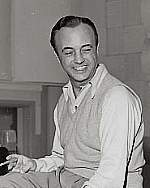
Raymond Dominic Sinatra was an Italian-born American conductor, best known as the music director of Mario Lanza.

The 500 Club, popularly known as The Five, was a nightclub and supper club at 6 Missouri Avenue in Atlantic City, New Jersey, United States. It was owned by racketeer Paul "Skinny" D'Amato, and operated from the 1930s until the building burned down in 1973.

A nightclub act is a production, usually of nightclub music or comedy, designed for performance at a nightclub, a type of drinking establishment, by a nightclub performer such as a nightclub singer or nightclub dancer, whose performance may also be referred to as a nightclub act. A scheduled performance, such as a wedding gig, is a club date.



















